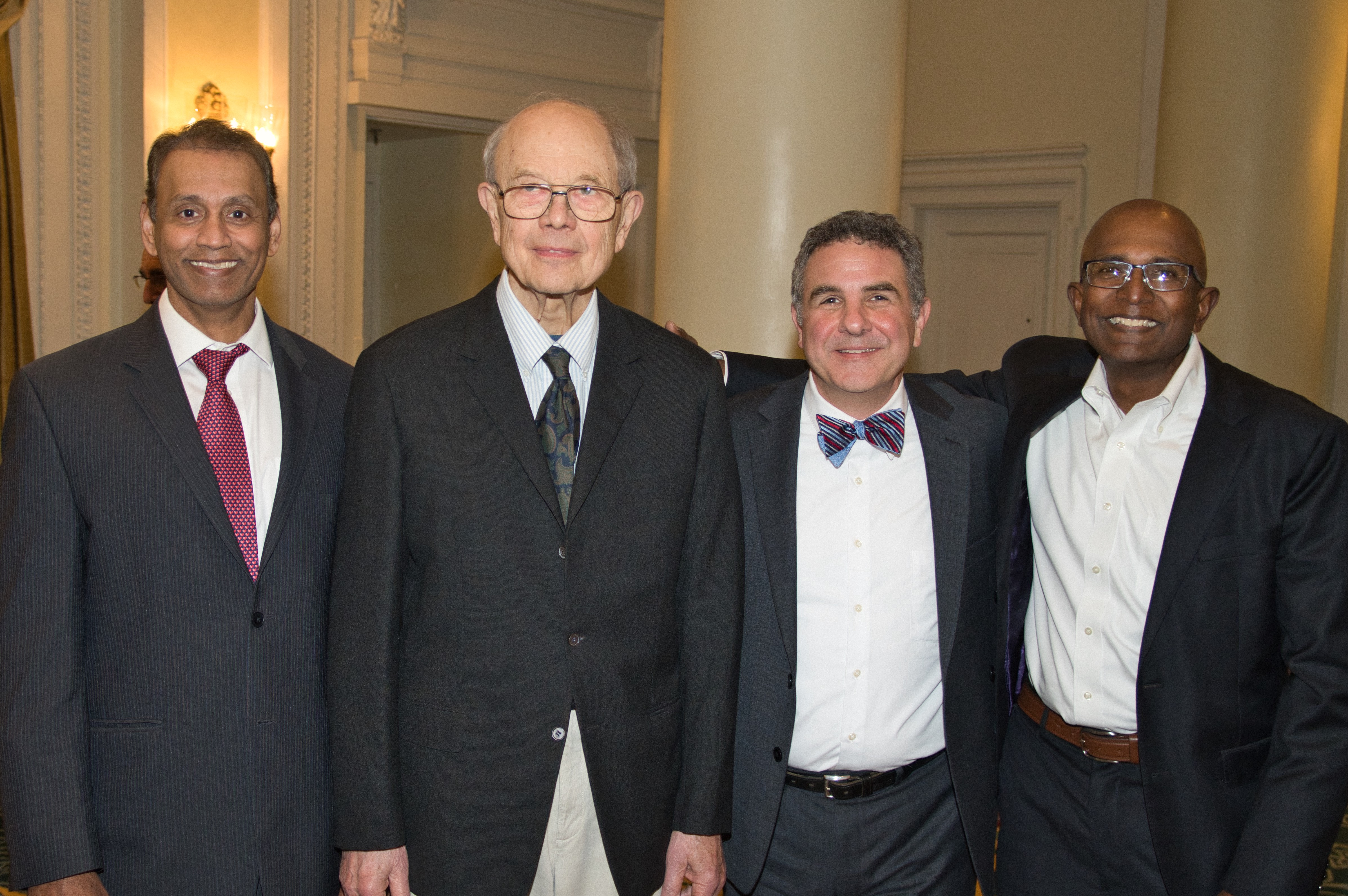
Szabolcs Szentpetery, M.D., H’75 (second from left), celebrates cardiothoracic surgeon Anthony Cassano, M.D., H’02 (on his right), the recipient of the 2022 Szabolcs Szentpetery Excellence Award. They are pictured with Mohammed Quader, M.D. (far left), interim chief of cardiothoracic surgery, and Vigneshwar Kasirajan, M.D., Stuart McGuire Chair in the VCU Department of Surgery. Photo by Joe Morris
Szabolcs Szentpetery, M.D., H’75, honed his skills as a cardiothoracic surgeon on the MCV Campus as well as at the Veterans Affairs Medical Center, where he started the cardiac transplant and cardiothoracic surgery programs and performed approximately 200 heart transplants in the space of nine years. Now retired, the 83-year old surgeon and teacher has extended his legacy through a philanthropic fund that will benefit students and the field of surgery for years to come.
With his wife, Victoria, Szentpetery has created the Szabolcs Szentpetery Excellence Award, a $100,000 endowment to recognize a fellow or faculty member who exemplifies mastery of the technical aspects of cardiothoracic surgery, academic excellence and excellence in teaching or study in the VCU Department of Surgery.
Szentpetery says he made his gift to express gratitude to his mentors — including transplantation pioneers David Hume, M.D., and Richard Lower, M.D. — as well as the institution. He says, “It was a historic time in medicine and a big stepping stone in the history of MCV when they introduced heart and kidney transplantation.”
Katherine M. Klein, M.D., F’20, received the first Szentpetery award in 2021. The 2022 recipient Anthony D. Cassano, M.D., H’02, learned of the honor at a March dinner celebrating the Brooks-Lower Visiting Professor and the legacy of Szentpetery.
“I work with some of the best people in the world, so to be chosen by them for this award is even more of an honor,” says Cassano, professor, VCU Division of Cardiothoracic Surgery.
Cassano calls Szentpetery humble, approachable and a master clinician. “Someone you want to emulate,” he adds. “Nothing was below him. It was not uncommon to go on the floor and find him sitting and writing notes to help the nurse practitioners or residents.”
Szentpetery faced his own challenges — and rewards — coming up in the early days of heart transplantation. “We tried many different ways of preserving the transplant organs, using different transplantation protocols, different medications, doing what we could to move the science further ahead.”
No experience could match seeing patients begin to heal, Szentpetery says, recalling his “tremendous joy” at seeing one patient live 30 years after his heart transplant.
Szentpetery also treasures what he calls the biggest miracle: “You would take a donor heart, put it on ice, and it would just be sitting there. But then you sew it in, and it starts functioning.”
Szentpetery’s own life includes many twists and turns. Born in Hungary, he grew up during World War II and sought political asylum in Germany before coming to the United States, where he found a training position on the MCV Campus. Partway through the medical program, he was drafted to Vietnam, where he worked in hospitals close to the border of Cambodia. Some of these experiences inspired his desire to help veterans, who – as his patients later in life – would sometimes call him “Saint Pete.”
“Dr. Szabolcs ‘Pete’ Szentpetery’s impact on cardiothoracic surgery at VCU Health System, the Veterans Hospital and, indeed, all of Virginia is immense,” says Vigneshwar Kasirajan, M.D., Stuart McGuire Chair in the VCU Department of Surgery. “He is a master surgeon and has trained generations of skilled surgeons who have continued to provide care and impact the health of patients globally. Having his name associated with this generous gift will allow us to recognize his contributions and encourage others to follow his example of excellent clinical care balanced with teaching and innovation. We are deeply grateful to Pete and his family for this generous gift.”
Szentpetery speaks more about the contributions of his mentors than his own work. “Working alongside my mentors at MCV was one of the greatest experiences of my life,” he says. “It taught me about life, surgery, dedication and self-sacrifice."